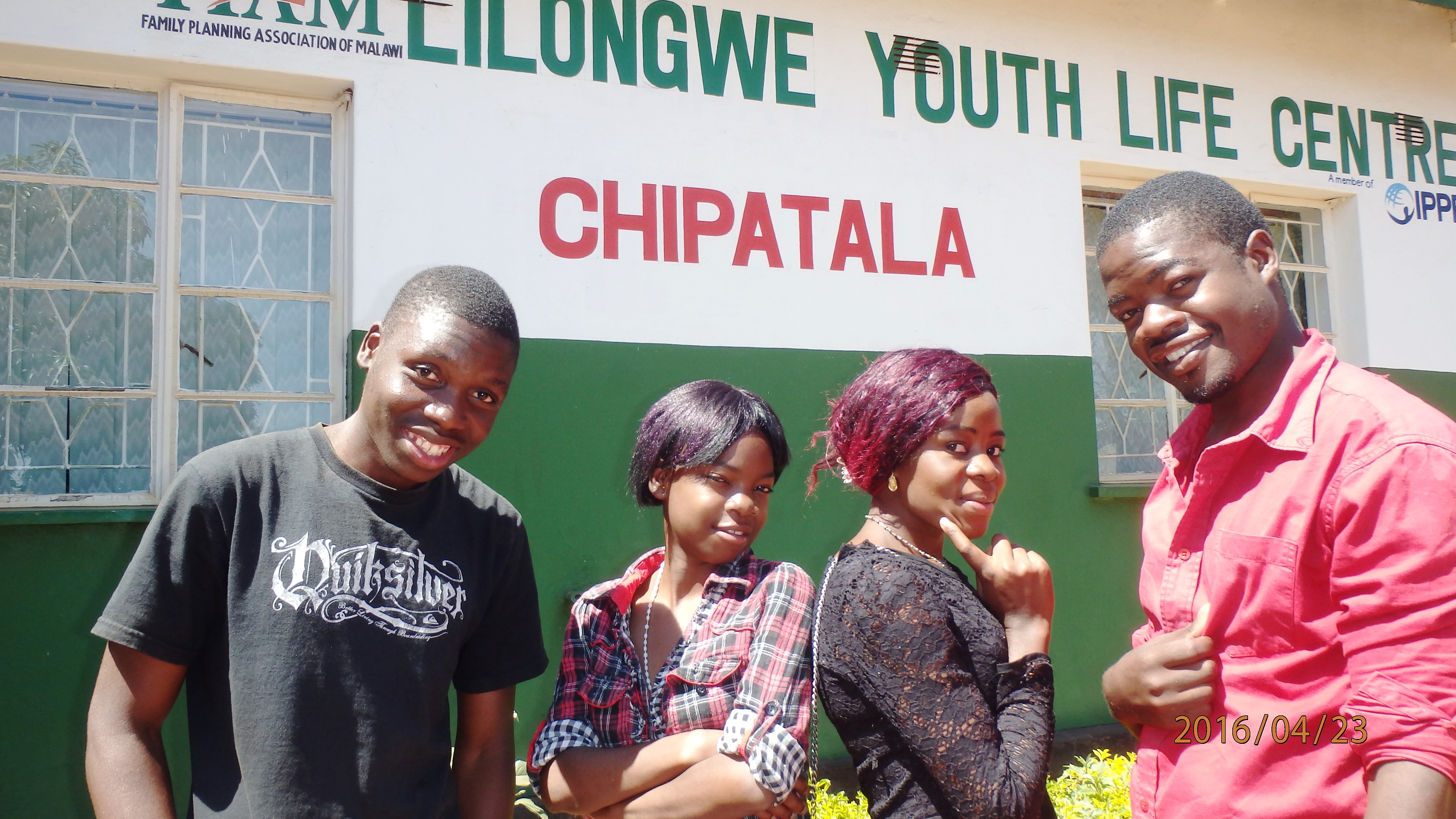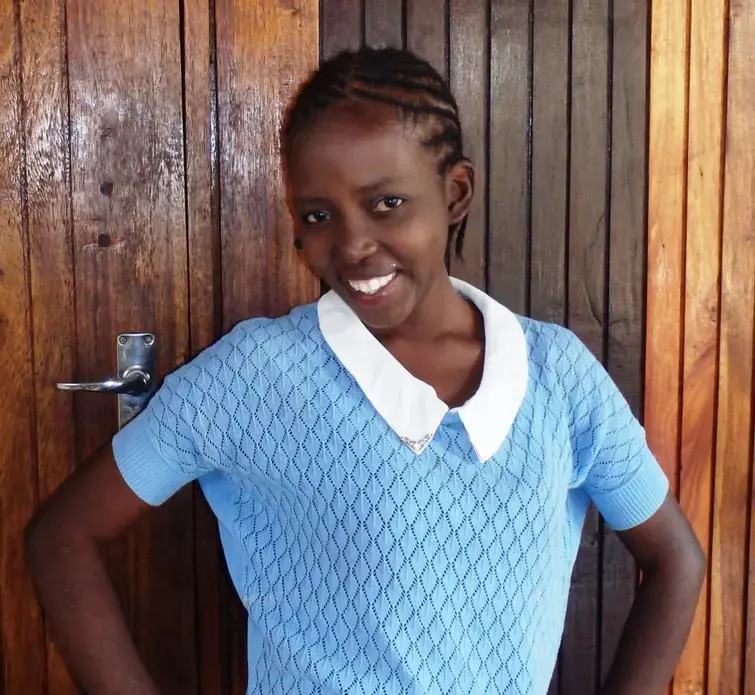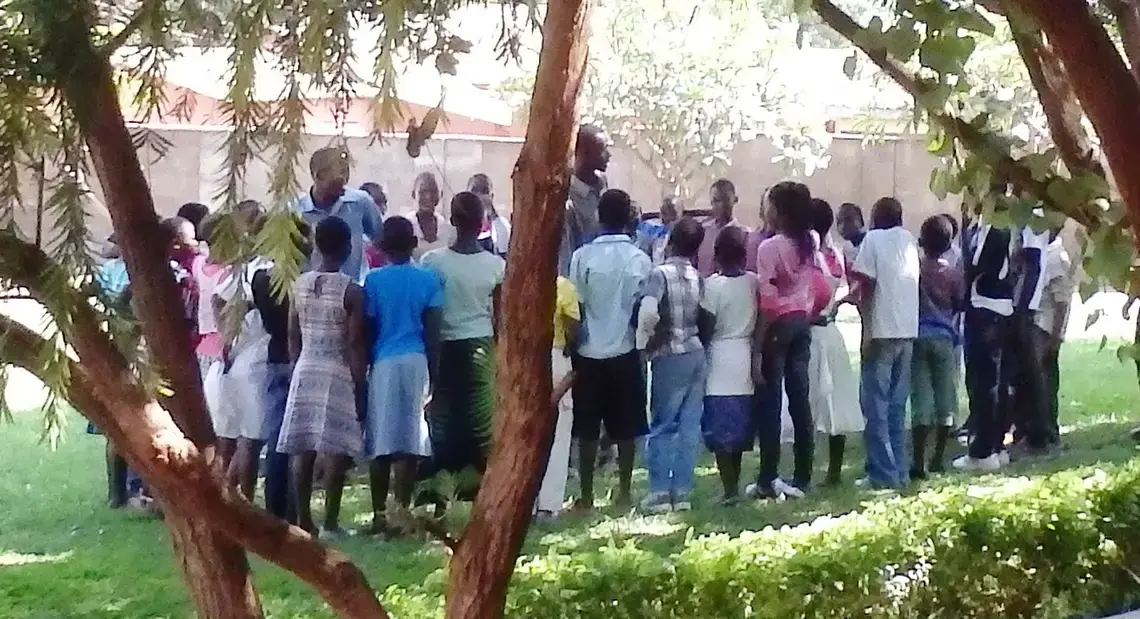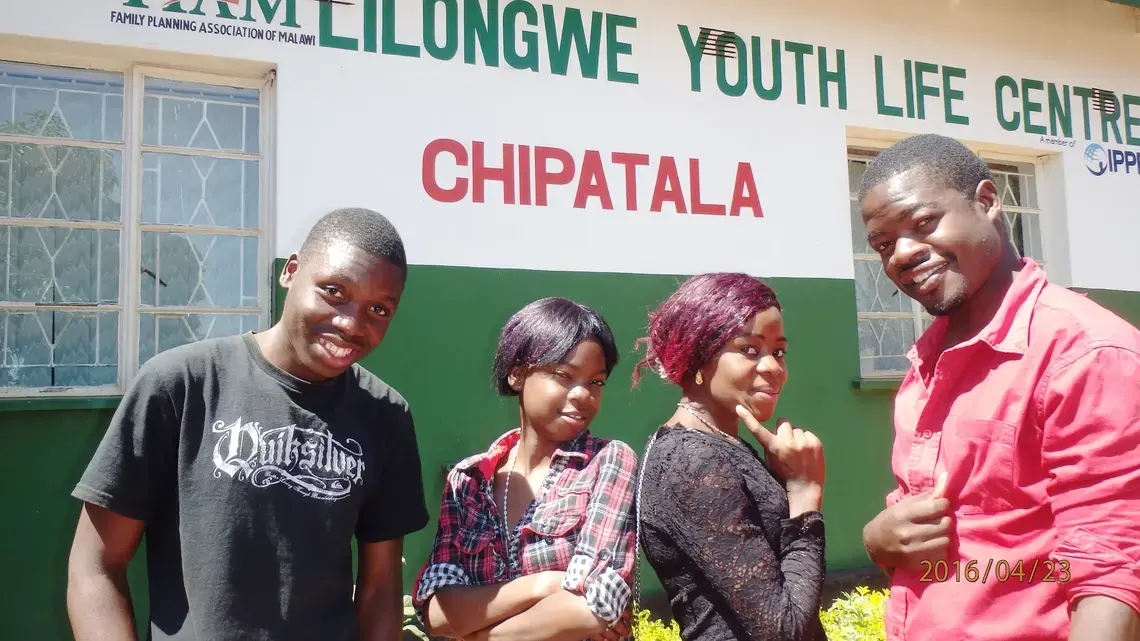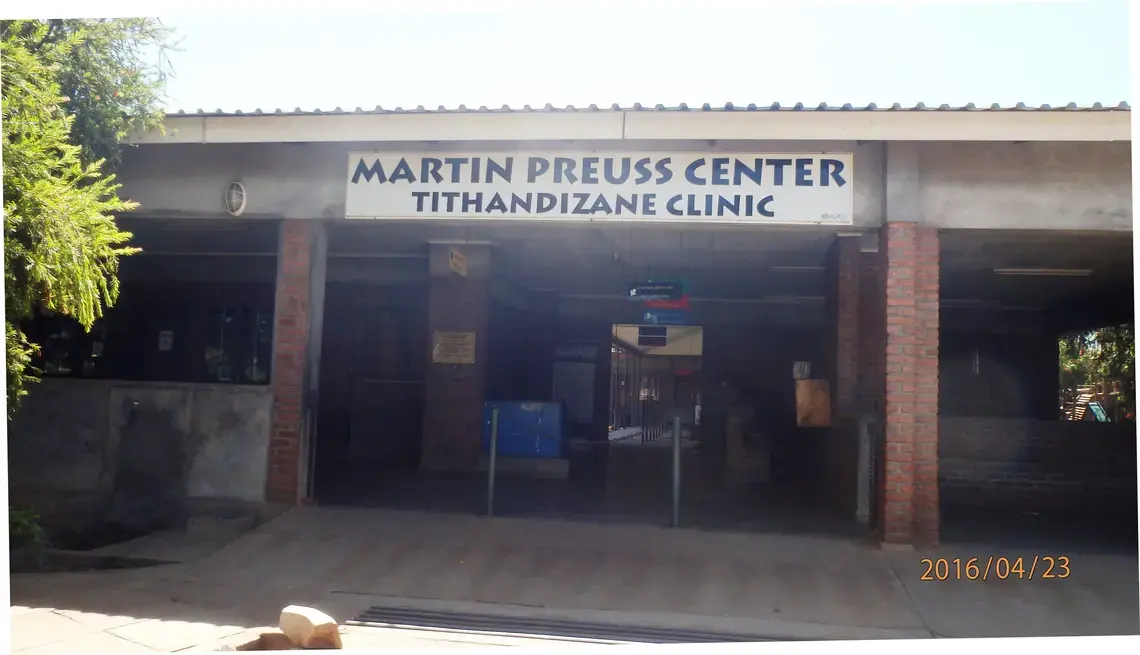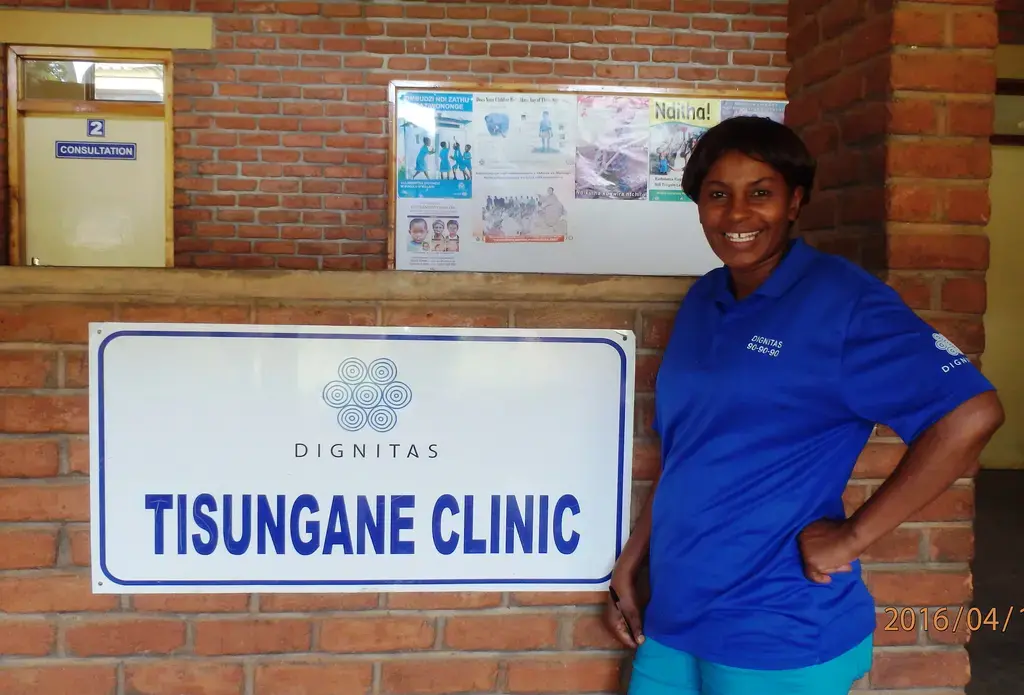Some 200 young Malawians are tightly packed onto benches, leaving 2 girls and 2 boys standing in the middle wide-eyed and apprehensive. One of the girls, not a day older than 15, is shifting nervously from foot to foot. The 4 are newcomers to Tisungane teen club, in the city of Zomba. After introducing themselves, 200 teens descend to give them a hug or a jovial slap on the back. Smiles erupt onto their faces. These 4 have taken the first step in getting the support they need living as teenagers with the human immunodeficiency virus (HIV) in Malawi.
Tisungane Clinic's teen club in Zomba Central Hospital is one of many throughout Malawi that support HIV-positive adolescents. These clubs are a lifeline for teens—mostly between the ages of 10 and 19—who are not only dealing with the physical, emotional, and sexual changes of adolescence, but are also learning for the first time that they have been lied to their whole lives about a disease that leaves them feeling stigmatized and alone. However, the clubs provide the space for acceptance and healing.
HIV in Adolescents
According to UNICEF, the leading cause of death in Africa of people aged 15-19 is AIDS. Despite a decline in HIV in the general Malawian population from nearly 12% in 2004 to just over 10.5% in 2010, the prevalence rate among adolescents has actually increased in 15-19 year olds. In 2013, the Malawian Ministry of Health estimated that 4.2% of girls and 1.3% of boys were living with HIV—which translates to approximately 93,000 adolescents living with the disease and nearly 7,000 HIV-related teen deaths that year.
The Forgotten Ones
Among this group is the cohort of children who simply missed out on today's successful and widely promoted "prevention of mother to child transmission" (PMTCT) programs. These programs stop HIV-positive mothers from passing the virus to their babies either in utero, during birth, or while breastfeeding.
However, in the late 1990s and early 2000s, these programs didn't exist. Even just before 2011, anti-retroviral drugs (ARVs), or anti-HIV medicines, were only given to pregnant women with a low number of CD4 cells—helper cells that fight infection. In 2011, Malawi pioneered Option B+, offering lifelong ARVs to all HIV-positive pregnant women regardless of CD4 count. By 2013, nearly 80% of HIV-positive mothers in Malawi were receiving ARVs—a stark contrast to 2009 when less than 20% received the drugs. Consequently, mother-to-child HIV transmission rates have fallen dramatically.
Option B+ is a huge success that has now been adopted by most countries in sub-Saharan Africa. In the shadows, however, are the children who were born to HIV-positive mothers before services were available. These children are now coming of age, learning not only that they are HIV-positive for the first time, but that they have been deceived by the adults they trusted.
What pulled teens away from the brink of hopelessness was the sense of community they found through teen clubs and support groups for young people living with HIV.
Tiwale means "shining star" in Chichewa, one of the local languages of Malawi. Similar to Tisungane Clinic and Teen Club in Zomba, Tiwale Clinic and Teen Club operates every second Saturday at Bwaila Hospital in Lilongwe. More than 430 HIV-positive young people from ages 10 to 20 attend clinical visits to receive medicine without the throngs of adults present on weekdays. This privacy is important to young people.
Both Tiwale and Tisungane clinics were started after clinicians noticed how many adolescents stopped taking their medicine (defaulting). This puts their lives in danger as HIV can quickly destroy the immune system and mutate, leading to drug resistance. According to the Guidelines for the Use of ARVs in Pediatric HIV Infection, poor adherence among adolescents may be due to a number of factors, including side effects, frequency of dosing, or psychosocial reasons. Many teens default on their medicine after the shock of learning they are HIV-positive. "I was weeping when I found out, confused, and crying. I stopped taking the medicine. Without Tiwale, I would have been dead," said Maria. For HIV-positive teens in boarding school, it may be a question of how best to hide taking their medication when confronted with frequent doses. "My friends didn't know. I used different pill bags and told them it was for asthma," Maria said. For these reasons, teen clubs focus on the importance of adhering to medicine.
In addition to clinical assessments, teens attend sessions on life skills and receive psychosocial support. Baylor University started one of the first adolescent clubs in 2006 at their clinic near Kamuzu Central Hospital where they have a small campus. Currently approximately 800 teens are enrolled. Simon Mtambo, teen club coordinator at Baylor, added, "There is a power [for these teens] in just knowing another adolescent that is HIV positive."
The one precondition to entry in the clubs is that teens must know their status. However, disclosure in the community is still a hurdle for most teens as stigma is a painful reality. At 14, Innocencia Mpinda told her best friend of her status. Now 18, she remembers how she felt after her friend spread the news: "I didn't want to go back because I was ashamed. I relocated to another school." Tionge (name changed at her request), 21, recalled a similar incident with a friend when she was 14. "People are not educated enough," she said.
According to UNICEF, there are half a million children orphaned by AIDS in Malawi. Teen clubs provide a supportive adult network that can step in during cases of discrimination from guardians. Mpinda, for example, experienced discrimination at the hands of the grandparents raising her. "He (my grandfather) wouldn't eat my food, not touch my property," she said. Staff at Tisungane teen clinic intervened on Mpinda's behalf.
What Next?
Despite the successes of the teen club, Joe Gumulira, senior clinician and focal point for pediatric and adolescent services at Lighthouse Clinic in Kamuzu Central Hospital, worries about the "poverty cocoon" given the majority of teens have lost one or both parents. "How will they fit into society if they don't have all the jigsaw pieces? Maybe they had to delay school—what next? Did we make them live so long just to experience poverty?"
This cry for education and career development is also voiced by the teens. Harrison Chirwa, 23, the group leader of a support group for HIV-positive youth called Nzotheka, (meaning "it's possible" in Chichewa), concurred: "Most people don't have biological parents. They don't have school fees and many can't finish tertiary education. We need more educated people living with HIV."
Yanjanani Magaleta, whose name means "unity," lost both parents at a young age. Her lifelong dream is to be a nurse. Although admitted to nursing school last year, Magaleta, age 21, has struggled to meet tuition fees. "Girls must be encouraged to go to school, to depend on themselves," she said. As one member of Nzotheka echoed, "Train the youth so they can help themselves. Let us stand on our own."
[This story was updated on October 9, 2021.]


